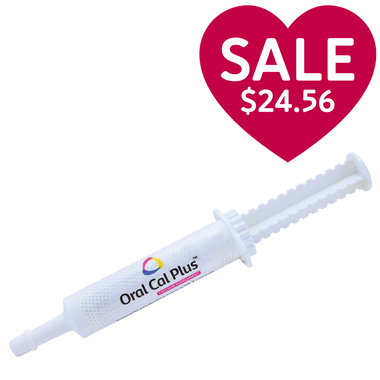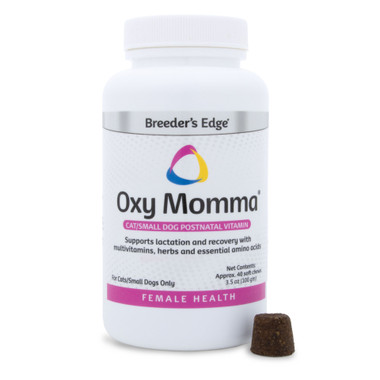Calcium for Dogs? Who knew? We've got the skinny for You!
Estimated 0 min read
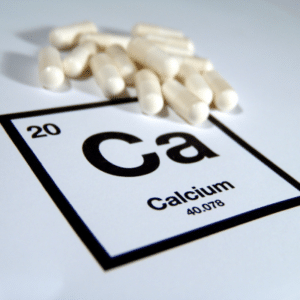 What to Know About Calcium for Dogs in 2024
What to Know About Calcium for Dogs in 2024
Imagine your beloved dog with boundless energy, a shiny coat, and a zest for life that’s truly infectious. It’s the vision every dog owner holds dear.
But achieving and maintaining this level of vitality can be a puzzle, with pieces like nutrition, exercise, and healthcare needing to fit just right.
In this exploration, we’re here to help you unlock the secrets to your dog’s vibrant well-being. We’ll journey into the heart of canine health, exploring the science behind their needs and the practical steps to ensure they thrive.
So, if you’re curious about the art of keeping your furry friend at their best, read on.
Quick Facts About Calcium for Dogs
- Calcium plays a vital role in bone health, muscle function, and more in dogs
- Balanced natural sources and cautious supplementation ensure optimal canine calcium intake
- Veterinary guidance is essential for precise dosing and choosing the right calcium supplement
Understanding the Role of Calcium for Dogs

Calcium is essential for Dog bone strength
Calcium, a vital mineral in the canine diet, is not merely a building block for bones and teeth; its role is deeply embedded in the intricate workings of canine physiology. This mineral’s significance is multifaceted, influencing various essential bodily functions, making it a cornerstone of canine health.
Central to calcium’s role is its contribution to skeletal integrity. In puppies, adequate calcium intake is paramount for the proper formation and growth of bones. This is particularly critical during their rapid developmental stages, where calcium deficiency can lead to skeletal malformations such as rickets. In adult dogs, calcium continues to play a crucial role in maintaining bone density and strength.
Muscle Function
Beyond skeletal health, calcium’s influence extends to muscular function. It is a key player in muscle contraction, including the vital contractions of the cardiac muscle. This underscores calcium’s importance in maintaining not only musculoskeletal health but also cardiovascular stability. Furthermore, calcium is instrumental in the blood coagulation cascade, a complex process essential for wound healing. It also facilitates nerve impulse transmission, highlighting its role in the nervous system and overall canine neurological health.
Your Dog’s Diet

Be sure your dog’s diet includes calcium
The requirement for calcium in a dog’s diet varies significantly, influenced by age, breed, and health status. Growing puppies, for instance, have heightened calcium needs to support their rapid bone development. Pregnant and lactating dogs also require increased calcium to nurture developing puppies and maintain their own calcium reserves. Conversely, an excess of calcium, particularly in large breed puppies, can predispose them to orthopedic disorders like hip dysplasia, illustrating the necessity of a balanced approach to calcium supplementation.
Calcium’s balance in a dog’s diet is a nuanced aspect of canine nutrition. Both deficiency and excess can lead to significant health issues. Insufficient calcium intake can result in developmental problems in young dogs, while excessive calcium, especially in large breeds during their growth phase, can lead to developmental orthopedic diseases.
Understanding and managing calcium intake is key to maintaining canine health, particularly when considering the varied needs of dogs at different life stages and conditions.
The Sources of Calcium for Dogs
When considering the dietary needs of dogs, particularly in terms of calcium, it’s imperative to understand both natural sources of this essential mineral and how to interpret its presence in commercial dog food. This knowledge is crucial for ensuring that dogs receive the right amount of calcium for their health and well-being.
Natural sources of calcium for dogs are varied and can be easily incorporated into their diet. Dairy products, such as cheese and yogurt, are well-known for their high calcium content. However, it’s important to note that some dogs may be lactose intolerant, and these foods should be introduced cautiously. Fish, especially salmon and tuna, are not only rich in calcium but also provide essential omega-3 fatty acids, beneficial for a dog’s skin, coat, and joint health. Additionally, certain vegetables like broccoli and spinach are good sources of calcium. While these may not be as palatable to some dogs, they can be mixed with other foods to enhance their diet.
Read the Labels!
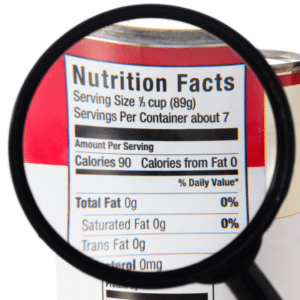
It’s always a good idea to check the dog food label
Understanding dog food labels is another critical aspect of ensuring adequate calcium intake. Commercial dog foods are formulated to meet the specific nutritional needs of dogs, including their calcium requirements. The Association of American Feed Control Officials (AAFCO) sets standards for pet food, ensuring that products labeled as “complete and balanced” meet the necessary nutritional requirements for dogs at various life stages. When selecting a commercial dog food, it’s important to look for the AAFCO statement on the label, which indicates that the food provides a balanced diet.
However, it’s not just about the presence of calcium in the diet; the balance of calcium to other nutrients, particularly phosphorus, is also vital. An appropriate calcium-to-phosphorus ratio is essential for optimal bone health and development. This ratio is especially crucial in growing puppies and lactating females, where an imbalance can lead to health issues.
In debunking common myths about calcium in dogs’ diets, it’s important to understand that while calcium is essential, more is not always better. Excessive calcium intake, particularly in large breed puppies, can lead to developmental orthopedic diseases. Therefore, a balanced approach to calcium supplementation, guided by a veterinarian, is key.
Navigating Calcium Disorders in Dogs
Calcium plays a pivotal role in various bodily functions, and imbalances can lead to significant health issues in dogs. Two primary conditions related to calcium imbalance are hypocalcemia and hypercalcemia, each presenting unique challenges and requiring specific interventions.
Hypocalcemia in Dogs

Nursing dogs need more calcium in their diet
Hypocalcemia, or low blood calcium, can manifest in various symptoms, including muscle tremors, seizures, stiffness, and restlessness. This condition is particularly prevalent in nursing dogs, where the demand for calcium increases significantly due to milk production. In such cases, the body’s calcium reserves may become depleted, leading to this deficiency. Small breed dogs and those nursing large litters are especially susceptible. Immediate veterinary intervention is crucial in these scenarios, as prolonged calcium deficiency can lead to serious health complications.
Hypercalcemia in Dogs
Hypercalcemia, characterized by elevated calcium levels in the blood, presents a different set of challenges. Symptoms may include increased thirst and urination, lethargy, and lack of appetite. The causes of hypercalcemia can vary, ranging from dietary imbalances to underlying health conditions such as kidney disease or certain types of cancer. Addressing hypercalcemia often involves treating the underlying cause and adjusting the dog’s diet to regulate calcium levels.
When considering calcium supplementation, it’s essential to approach with caution. Supplementation is generally recommended in specific scenarios, such as dogs on homemade diets that may lack sufficient calcium, or in cases of diagnosed calcium deficiencies. However, indiscriminate supplementation can lead to an excess of calcium, particularly harmful in large breed puppies, where it can contribute to developmental orthopedic diseases.
How to Choose the Best Calcium Supplement for Your Dog
Selecting the right calcium supplement for your dog is a meticulous process that demands careful consideration. To make an informed choice, it’s essential to delve deeper into how to evaluate different calcium supplements and determine which one is best suited for your dog’s specific needs.
Consult Your Veterinarian

Your vet will know how much calcium intake your dog can handle
Before embarking on a supplement selection journey, consult your veterinarian. Their expertise will provide valuable insights into whether your dog actually requires calcium supplementation. They can also guide you on the appropriate dosage and the most suitable type of supplement based on your dog’s age, breed, and health status.
Assess the Supplement’s Source of Calcium
Calcium supplements can be derived from various natural sources, such as bone meal, ground eggshells, and seaweed. Natural sources of calcium often contain other essential nutrients like phosphorus, magnesium, and trace minerals. For instance, bone meal not only provides calcium but also contributes phosphorus, which is essential for bone health. Seaweed-based supplements may offer additional minerals and micronutrients beneficial for overall well-being.
In contrast, synthetic calcium supplements are manufactured using chemical processes to create calcium compounds like calcium carbonate or calcium citrate. Synthetic supplements are often preferred when precise dosing control is necessary. They provide a specific amount of calcium without the variability inherent in some natural sources.
The bioavailability of calcium, or the degree to which it is absorbed and utilized by the body, can also vary depending on the source. Natural sources of calcium are often accompanied by other nutrients that enhance absorption. For example, vitamin D is crucial for calcium absorption in the intestines. Synthetic supplements can provide calcium in a highly absorbable form, but they may lack these co-factors that enhance utilization.
Finally, consider your dog’s dietary needs when evaluating the supplement. For dogs with specific dietary restrictions or allergies, natural sources like bone meal may not be suitable if they have an aversion to animal-derived products. Synthetic supplements may be a more convenient and hypoallergenic choice for these pups.
Examine the Calcium Content
Ensuring that the calcium supplement you’re evaluating has the right calcium content is critical.

Not all dogs need the same amount.
To begin, assess whether the calcium content in the supplement aligns with your dog’s specific calcium requirements. This determination hinges on several factors, including your dog’s age, breed, size, and overall health status. Puppies, for instance, have substantially higher calcium requirements during growth phases compared to adult dogs. Larger breed puppies, in particular, require careful attention to prevent excessive calcium intake, which can lead to developmental orthopedic diseases.
It’s also essential to consider the balance between calcium and other nutrients in your dog’s diet, notably phosphorus. Calcium and phosphorus are intricately linked, and their balance is crucial for optimal bone health and development. Imbalances can lead to skeletal issues, emphasizing the importance of monitoring the ratio of these minerals in your dog’s diet.
The amount of calcium your dog requires may also vary based on their regular diet. If your dog primarily consumes commercial dog food, it’s important to factor in the calcium content of the food itself. Conversely, dogs on homemade diets may require closer scrutiny of the calcium content to ensure they receive adequate levels without overdoing it.
The precision of calcium dosage is another key consideration. Synthetic calcium supplements, for instance, offer precise control over the amount of calcium administered, reducing the risk of over-supplementation. Natural sources of calcium may provide variability in calcium content, making it essential to accurately measure and monitor intake.
However, to truly navigate the intricate web of calcium content and dietary balance, consulting with a veterinarian is indispensable. Veterinarians can perform calculations based on your dog’s specific needs and guide you in selecting a supplement with an appropriate calcium content. They can also monitor your dog’s progress to ensure that calcium levels remain within the desired range.
Consider Form and Administration:
Calcium supplements come in various forms, including powders, tablets, chewables, and liquid solutions. Each form has its unique characteristics.
Powders
Calcium powders can be mixed into your dog’s food. This form offers flexibility in adjusting the dosage according to your dog’s needs. However, some dogs may detect and reject the powder in their food.
Tablets
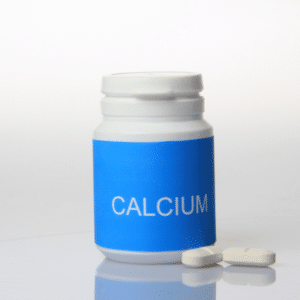
There are many choices when it comes to forms
Calcium tablets provide a convenient and pre-measured dose. They are easily administered, making them a practical choice for many dog owners.
Chewables
Chewable calcium supplements often have added flavorings to make them more palatable for dogs. This form can be enticing for dogs, making supplementation less of a challenge.
Liquid Solutions
Liquid calcium supplements can be mixed with your dog’s food or administered directly into their mouth using a dropper. This form is particularly useful for dogs with difficulty swallowing tablets or capsules.
Regardless of which form you choose, you must also consider the efficiency of calcium absorption provided by the supplement. Powders mixed into food may be subject to variations in absorption, depending on the overall diet and the presence of other nutrients that influence calcium uptake. Liquid solutions may offer more consistent absorption, while tablets and chewables provide a standardized dose.
Above all, your veterinarian’s expertise should help you make an informed choice to esnure the selected form aligns with your dog’s specific dietary requirements and contributes to their overall well-being.
Banixx Dog Care
At Banixx, we’re dedicated to your furry companion’s happiness and vitality. Our commitment extends beyond calcium to a plethora of topics essential for your dog’s well-being.
We invite you to join us on this journey of discovery, where you can unearth the secrets to keeping your dog not just healthy, but thriving.
From nutrition to grooming, training to overall wellness, Banixx is your trusted companion for keeping your dog happy and healthy! We hope you’ll come back toour blogto learn more about how to keep your furry, four-legged friend happy and healthy. If, on the other hand, you are interested inif you can use Neosporin on dogsortreatment for dog acne, yes, we cover that too. Or are you interested in more quirky items? such ashow long can a dog go without peeing, yep, we’ve got that covered.
Sources
https://www.vet.cornell.edu/departments-centers-and-institutes/riney-canine-health-center/canine-health-information/re-evaluating-your-dog-s-diet
https://cvm.msu.edu/vdl/laboratory-sections/endocrinology/calcium-disorders-1
https://vcahospitals.com/know-your-pet/calcium-supplements
https://www.dailypaws.com/dogs-puppies/dog-nutrition/dog-vitamins-supplements/calcium-supplements-for-dogs
https://wagwalking.com/wellness/calcium-for-dogshttps://pettable.com/blog/what-are-the-best-sources-of-calcium-for-dogs
https://vetnutrition.tufts.edu/2023/05/what-nutrients-are-essential-for-my-pet/











